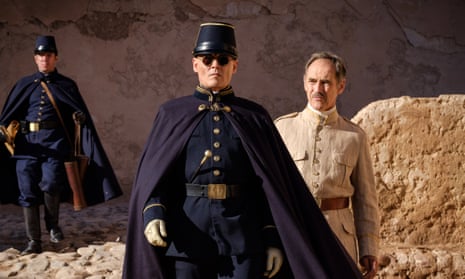The Colombian director Ciro Guerra (Embrace of the Serpent) seems interested in the processes by which the west colonised the rest, so it’s fitting that he has cast two big Hollywood stars – Johnny Depp and Robert Pattinson – in his latest, premiering ominously on the second to last day of the Venice film festival, when roughly a third of the press corps have decamped to Toronto.
An adaptation of JM Coetzee’s 1980 novel, Waiting for the Barbarians tells the story of a magistrate presiding over an unidentified colonial outpost in the middle of the desert, presumably in the first decades of the last century. Gentle-voiced and crinkly eyed and played by Mark Rylance, he sees his comfortable equanimity shattered by the arrival of state security officers. They’re led by Depp, who looks more like a skull wrapped in butcher’s paper every day. Evocatively photographed by Chris Menges in Morocco as well as Italy, Guerra’s stately, frequently horrific fifth feature recalls both Kafka’s In the Penal Colony and Graham Greene, with Rylance as a sad sack powerless to stop the ruthlessly mechanical infliction of pain.
Chapter headings that cycle through the seasons signpost the unravelling that occurs after Depp’s Colonel Joll arrives for an inspection and begins torturing the locals. A nomad accused of stealing a sheep has his eye gouged out, but not before “admitting” that his people are readying for a full-blown frontier war. That news, as well as the magistrate’s discomfort with the colonel’s methods, is reported up the chain, leading to further intervention from the navy-suited state police. It’s easy to read the film as a not particularly subtle metaphor for fascism or “the war on terror”, and its black hats aren’t so much characters as automatons.
Hair slicked back and parted down the middle, Depp sports a natty pair of circular sunglasses that obscure the colonel’s eyes and emotions, if indeed he has any. Working again with the kind of indie auteur he gravitated towards before his 15-year run as a blockbuster star, the actor makes a meal of some of his lines here, but he seems positively relaxed next to Pattinson, playing a variation on the diabolical theme.
Pattinson is a puzzle. Such a revelation in Good Time, and charismatically enigmatic in The Lost City of Z, he just as often looks uncomfortable. His performance here is somehow both stiff and overarticulated. At least he gets one of the film’s best lines, when he thanks the residents of the fort he’s terrorised for their hospitality, then scarpers.
Greta Scacchi has a thankless role as a cook running Rylance’s household, but the magistrate’s key relationship is with an Indigenous woman (Gana Bayarsaikhan) crippled by Depp’s toadies. His deepening affection for her leads him into the desert to return the girl to her people, and some of the widescreen compositions in this section – of stucco parapets silhouetted against a darkening blue sky, of riders ringed by bands of sun-gold at dusk – have a startling beauty. But the grandeur of the wide open spaces is short lived, and on the magistrate’s return he’s thrown into a cell for treating with the enemy.
His rejection by the woman he loves but failed to protect presages a more pointed reckoning, and the magistrate is left, in the end, holding the bag. Guerra has tweaked the novel’s Beckettian coda, and the film’s final shot provides a full stop that is, in 2019, appropriately apocalyptic. The barbarians are us, and the wait is over.

Comments (…)
Sign in or create your Guardian account to join the discussion